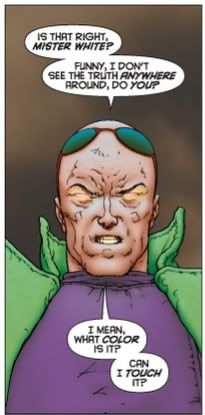God's in his Heaven - All's right with the world!
/![]() All Star Superman #12
All Star Superman #12

This is the last issue of this series, barring future specials or two-issue story bursts from writer Grant Morrison and various unknown possible artists - regardless, it surely is an ending. A GOOD one, as a single issue, if sapped of immediacy by Morrison's rigorous prior explorations of his themes, in more interesting single issues (I'm thinking #10). Frank Quitely & Jamie Grant do keep the pace nicely -- which means some fine physical poise and a few helpfully low-detail clouds of dust in various backgrounds -- although this isn't so much a grand finale as a concluding step off the ledge into inevitability.
But then, the issue is titled Superman in Excelsis, so maybe a bit of godly distance is appropriate. And Morrison's approach to the Superman mythos is nothing if not Catholic! Allow me go into some detail, thus ruining all surprises forever. This is a capstone issue, one covering the top of Superman's tomb. Yes, he does die - sort of. He 'dies' in that he has to leave humanity to their own devices by becoming a prolonged temporary part of the sun -- poisoned by Solaris the Tyrant! -- thus joining fully with the source of his powers and literally shining his radiance down on Earth.
It's fully the end of Morrison's take on the character, one that saw him face down his mortality by confronting various doppelgängers and alternate visions of himself, to the eventual effect of his preparing humanity to take the next step without him; Morrison is maniacal in his enthusiasm for the character, gleefully pushing him in ever more heavenly directions, at one point having him literally create our universe -- presumably after this 'death' he rises again as Superman Prime, as per issue #6 and Morrison's own much-referenced Old Testament of JLA: One Million -- but his is a theology that realizes the day-by-day is utterly left to people, who have the potential to be like gods themselves.
But Superman knew that before he knew it, you know? As Our Hero noted way back in issue #2, concerning the gates to his mighty Fortress:
"One day some future man or woman will open that door with that key.
"When they do, I want them to know how it felt to live at the dawn of the age of superheroes."
Knowing all we know now, the obvious suggestion is that superheroes will stop dropping from the sky into the heartland and start rising from the grass itself. Which isn't to say that no mortals at all can fly in the present:

I like that Morrison has characterized Lex Luthor as the world's most pompous skeptic -- because it's funny -- but I like even more that it isn't the skepticism that makes Luthor wicked - it's his unwillingness to use his obviously formidable talents to do anything but stroke his own persecution complex. As Quintum notes at the end of this issue, without a Superman to tangle with, Luthor simply fades away.
Oh, did anyone else think Quintum was somehow Luthor in disguise for most of this series? I sure did - that was my big secret theory. But I think Morrison has done something more interesting; if Luthor is Superman's most profound mirror image, then Quintum is ultimately Luthor's, being a mad genius who struggles to accomplish things ("...the measure of a man lies not in what he says but what he does," as the series' first collected volume opines), and generally needs Superman to haul his sorry rainbow ass out of trouble. He's completed a journey by the end of the series too, his similarities to Superman's foe finally representing humanity's progress in the post-Superman era, where a statue stands in a park like in Whatever Happened to the Man of Tomorrow?, although Morrison's story doesn't turn on any loss of powers from this world - just the opposite.
All of this, granted, doesn't make for so much a pleasing issue of a comic as an assurance that notions raised in prior issues would reach completion. Issue #12 itself is actually a pretty low-key thing, with nearly half its space given to an elegiac cruise with Jor-El over an erupting Krypton (cute reversal of the famously concise destruction sequence from issue #1), and a mostly plain Superman/Luthor final throwdown in a dim Metropolis (we don't see the deadly blue sun until the end); I wish there'd been less orthodox superhero hitting and more of Luthor's gradual awareness as to the nature of the universe due to his artificially heightened intellect.
In the end, he can only weep from the human enormity of it all; fascinatingly, Morrison then has Superman make the cynical (if not unfounded) assumption that Luthor is merely realizing how he's been outsmarted again, allowing some gentle ambiguity to linger regarding both icons' positions as Greatest Good and Greatest Ill. It does make sense from this series' point of view, dealing in archetypes but unwilling to let any character sit quite still in his or her prescribed roles (and feel free to insert your favorite enlightenment-through-drugs-in-a-Grant-Morrison-comic joke here).
I look forward to reading through this whole series again, carefully, from start to finish; I'm sure there's plenty of variations lurking around, not to mention one million allusions to other works that I've missed. Yet I also think it's a very simple story, one that certainly doesn't need every last image to be puzzled over and indexed. Quintum's final stroll may lead to a colorful solid wall on that last page, but I think it's plain enough that whatever's behind it will be the new humanity, the people to lift the half-million ton key, the genetic mix of man and superman that will be the true descendants of the man of the title, sometimes peeking their heads back into the past, in that undying spirit of aid. Inspired.











